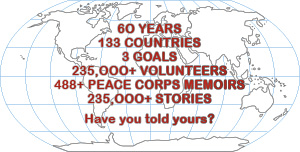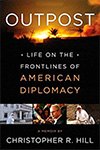The Volunteer Who Became an Ambassador to Five Countries — Chris Hill (Cameroon)

by Jeremiah Norris (Colombia 1963–65)
•
After graduating from Bowdoin College with a degree in Economics, Christopher R. Hill then served as a Peace Corps Volunteer in Cameroon from 1974 to 1976. He credited his work with Peace Corps for teaching him his first lesson in diplomacy.
As a Volunteer, Chris worked with credit unions. When he discovered that one Board of Directors had stolen 60% of their members’ money, he reported on the malfeasance to their members — who promptly re-elected the board because they had reflected the carefully balanced tribal interests, and it really did not matter to the members if the Board Directors ran a good credit union or not. Chris commented: “When something’s happened, it’s happened for a reason and you do your best to understand that reason. But don’t necessarily think you can change it.”
Chris joined the State Department in 1977, serving as Secretary for Economic Affairs at the U. S. Embassy in Seoul, South Korea from 1983 to 1985. When he returned to South Korea in 2004 as Ambassador, he began by saying “I was here for three years in the 1980s, one has to be a little careful about drawing on too much experiences from so long ago. So, even though I’ll certainly draw on my experience from the 1980s, I also need to do an awful lot of listening to people to understand what has been going on lately”.
That sentiment expresses the art of listening that carried Chris from his days as a Volunteer into a career that earned him the title of “Ambassador” in five different countries.
Chris was part of the team that negotiated the Bosnia Peace Accord in which he worked closely with the late Richard Holbrook serving as his Deputy at the Dayton Peace Talks. Holbrook described Chris as “brilliant, fearless and argumentative.” In his book, To End a War, he wrote that Chris “manages to be both very cool and very passionate.” This combination, Holbrooke went on to write “enhanced Hill’s extremely good negotiating skills.”
In February 2005, Chris was named to be the Head of the U. S. Delegation to the six-party talks aimed at resolving the North Korean nuclear crisis. As the Talks progressed into 2007 North Korea informed Chris that it had shut down the nuclear reactor at Youngbyon, and admitted an international inspection team. Chris cautioned North Korea that the shutdown was “just the first step. Verification the declaration will be difficult, because for now, the inspectors are limited in the Youngbyon complex”.
The talks dragged on and it seemed that little progress was being made. In 2009, Chris informed the Senate Foreign Relations Committee that talks are at a “critical, challenging” point.
Washington had refused to remove North Korea from its terrorism blacklist until the promised list of all its nuclear efforts were provided. “Let me be clear, Chris testified, complete and correct means complete and correct. This declaration must include all nuclear weapons, programs, materials and facilities, including clarification of any proliferation activities.” In Chris’s view, a positive outcome from these six party talks opened the door for fruitful dealings between the U. S. and China in other areas — as China was one of the party’s in the talks. At some point, Chris commented “in the long run we have to have a good working relationship with 1.3 billion people”.
Alongside his Ambassadorship to South Korea, Chis was also the Ambassador to: Albania, 1991–1991; Macedonia, 1996–1999; Poland, 2000–2004; and Iraq, 2009–2010. In between these assignments, he managed to be appointed Assistant Secretary of State for East Asian and Pacific Affairs. Then, while on a Fellowship with the American Political Science Association, he was a member of Congressman Stephen Solarz;’s staff working on Eastern European issues. He also served as the Special Envoy to Kosovo in 1998 and 1999, and as a Special Assistant to the President and a Senior Director on the staff of the National Security Council from 1999 to 2000.
Chris is currently an adjunct professor at Columbian University’s School of International and Public Affairs. In addition to overseeing the university’s global engagement, Chris is the author of Outpost: Life on the Frontlines of American Diplomacy winner of the Peace Corps Writers 2015 Paul Cowan Non-Fiction Award
In that time of his life, Christopher Hill served his country with distinction in some of our world’s most contentious arenas. His professional career was—and remains, in every aspect remarkable, comprised of achievements that are worthy of our country’s recognition for his unflagging service as they guide us toward a “more perfect union.” Surely, they exemplify adherence to Peace Corps 3rd Goal, warranting for Chris A Profile in Citizenship.
•
 Outpost: Life on the Frontlines of American Diploma
Outpost: Life on the Frontlines of American Diploma
Christopher R. Hill (Cameroon 1974–76)
Simon & Schuster
October 2014
448 pages
$30.00 (hardcover)
Thank you so much for this kind and thoughtful piece.
Julie Hill